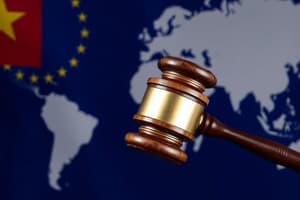Podcast
Questions and Answers
Which principle of state attribution considers the conduct of governmental authority as an act of the state?
Which principle of state attribution considers the conduct of governmental authority as an act of the state?
- Acts performed by private individuals
- Acts performed by third-party agents
- Acts performed by the state and its organs (correct)
- Acts of insurrectional movements
What is one of the core elements that is essential for invoking state responsibility?
What is one of the core elements that is essential for invoking state responsibility?
- The wrongful conduct must be attributed to the state (correct)
- The act must involve international treaties
- The wrongful act must be publicly condemned
- The act must be beneficial to the state
Which of the following best describes actions taken by an insurrectional movement in relation to state responsibility?
Which of the following best describes actions taken by an insurrectional movement in relation to state responsibility?
- They can be considered state acts if acknowledged by the state (correct)
- They only affect the current government, not state responsibility
- They are always attributed to private individuals
- They are never considered in state attribution
Which principle outlines that acts performed by organs on loan from another state are attributed to the borrowing state?
Which principle outlines that acts performed by organs on loan from another state are attributed to the borrowing state?
In international law, what role does self-defense play regarding state responsibility?
In international law, what role does self-defense play regarding state responsibility?
How does international law address the conduct of private individuals concerning state responsibility?
How does international law address the conduct of private individuals concerning state responsibility?
Which of the following articles addresses the principles of attribution in state responsibility?
Which of the following articles addresses the principles of attribution in state responsibility?
What is the main consequence if a state is found to have violated its obligations under international law?
What is the main consequence if a state is found to have violated its obligations under international law?
What is the primary focus of Article 5 of the ILC articles?
What is the primary focus of Article 5 of the ILC articles?
Under which circumstance does Article 6 determine state attribution?
Under which circumstance does Article 6 determine state attribution?
Which situation exemplifies a state being held responsible under Article 8 of the ILC articles?
Which situation exemplifies a state being held responsible under Article 8 of the ILC articles?
What must be proven for a state to be held responsible under Article 8 in the context of the Nicaragua case?
What must be proven for a state to be held responsible under Article 8 in the context of the Nicaragua case?
Which principle applies when a state attributes actions performed by private corporations engaging in state functions?
Which principle applies when a state attributes actions performed by private corporations engaging in state functions?
What is a potential drawback of privatizing military functions according to Article 5?
What is a potential drawback of privatizing military functions according to Article 5?
What is necessary for a state to successfully plead self-defense in international law?
What is necessary for a state to successfully plead self-defense in international law?
Which of the following circumstances would most likely lead to a state being implicated in a violation of international law during an insurrection?
Which of the following circumstances would most likely lead to a state being implicated in a violation of international law during an insurrection?
Which of the following statements best reflects the principle of state attribution regarding the actions of loaned state organs?
Which of the following statements best reflects the principle of state attribution regarding the actions of loaned state organs?
What is the primary purpose of a lawful countermeasure taken by a state?
What is the primary purpose of a lawful countermeasure taken by a state?
Under which circumstances may a state justify non-performance of an international obligation due to distress?
Under which circumstances may a state justify non-performance of an international obligation due to distress?
What does Article 25 concerning necessity refer to?
What does Article 25 concerning necessity refer to?
What is the immediate obligation of a state that has committed an internationally wrongful act?
What is the immediate obligation of a state that has committed an internationally wrongful act?
Which article specifies that a responsible state must make reparations for injuries caused by wrongful acts?
Which article specifies that a responsible state must make reparations for injuries caused by wrongful acts?
What must happen to a countermeasure once the internationally wrongful acts cease?
What must happen to a countermeasure once the internationally wrongful acts cease?
Which of the following statements about lawful countermeasures is incorrect?
Which of the following statements about lawful countermeasures is incorrect?
In which case can necessity be invoked by a state?
In which case can necessity be invoked by a state?
What year did the UN General Assembly recommend the articles on the Responsibility of States for Internationally Wrongful Acts?
What year did the UN General Assembly recommend the articles on the Responsibility of States for Internationally Wrongful Acts?
According to Article 4 of the ILC articles, which of the following acts is considered as an act of the state?
According to Article 4 of the ILC articles, which of the following acts is considered as an act of the state?
Which article addresses the principle concerning acts performed by third parties that are acknowledged by a state?
Which article addresses the principle concerning acts performed by third parties that are acknowledged by a state?
How many principles of state attribution are identified in the ILC articles?
How many principles of state attribution are identified in the ILC articles?
Which of the following is NOT a principle of state attribution according to the ILC articles?
Which of the following is NOT a principle of state attribution according to the ILC articles?
Which document laid the foundation for the articles on the Responsibility of States for Internationally Wrongful Acts?
Which document laid the foundation for the articles on the Responsibility of States for Internationally Wrongful Acts?
What is the primary outcome for a state found to have violated its international obligations?
What is the primary outcome for a state found to have violated its international obligations?
What significant event occurred in May 2001 regarding the articles on international responsibility?
What significant event occurred in May 2001 regarding the articles on international responsibility?
What is the primary condition under which a state may take countermeasures against another state according to Article 22 of the ILC articles?
What is the primary condition under which a state may take countermeasures against another state according to Article 22 of the ILC articles?
What examples does Article 5 of the ILC articles provide regarding the privatization of state functions?
What examples does Article 5 of the ILC articles provide regarding the privatization of state functions?
According to Article 24, which of the following situations allows an agent of a state to justify non-performance of an international obligation?
According to Article 24, which of the following situations allows an agent of a state to justify non-performance of an international obligation?
According to Article 6, which of the following scenarios would lead to acts being attributed to the receiving state?
According to Article 6, which of the following scenarios would lead to acts being attributed to the receiving state?
In the context of Article 8, what must be established for a state to be responsible for the actions of private individuals?
In the context of Article 8, what must be established for a state to be responsible for the actions of private individuals?
Under which conditions can a state claim precluding wrongfulness based on necessity according to Article 25?
Under which conditions can a state claim precluding wrongfulness based on necessity according to Article 25?
What obligation does a state have after committing an internationally wrongful act according to Article 30?
What obligation does a state have after committing an internationally wrongful act according to Article 30?
What significant legal case involved the attribution of responsibility surrounding the actions of the Contras?
What significant legal case involved the attribution of responsibility surrounding the actions of the Contras?
What must a responsible state offer according to Article 30(2) if required by the circumstances after committing a wrongful act?
What must a responsible state offer according to Article 30(2) if required by the circumstances after committing a wrongful act?
Which article specifies the state's responsibility for acts performed by governmental entities that do not possess formal status as state organs?
Which article specifies the state's responsibility for acts performed by governmental entities that do not possess formal status as state organs?
Which principle dictates that the acts of an organ loaned from one state are attributed to the receiving state?
Which principle dictates that the acts of an organ loaned from one state are attributed to the receiving state?
According to Article 31, what is expected of a responsible state in terms of reparations after causing injury due to wrongful acts?
According to Article 31, what is expected of a responsible state in terms of reparations after causing injury due to wrongful acts?
In which situation is a state not held accountable for the actions of a paramilitary group it supports?
In which situation is a state not held accountable for the actions of a paramilitary group it supports?
What is the maximum timeframe within which a countermeasure must be lifted after the cessation of internationally wrongful acts?
What is the maximum timeframe within which a countermeasure must be lifted after the cessation of internationally wrongful acts?
Which of the following has been increasingly privatized according to state attribution principles?
Which of the following has been increasingly privatized according to state attribution principles?
What is the main goal of lawful countermeasures according to international law?
What is the main goal of lawful countermeasures according to international law?
Flashcards
State Responsibility
State Responsibility
A system of international law rules outlining when a state violates its obligations, and the consequences.
Attribution of Conduct
Attribution of Conduct
Determining if a state is responsible for the actions of its organs or private individuals.
State Organs Action
State Organs Action
All actions of a state's government bodies (like ministries) are considered actions of the state.
Governmental Authority
Governmental Authority
Signup and view all the flashcards
Acts by Private Individuals
Acts by Private Individuals
Signup and view all the flashcards
ILC Articles
ILC Articles
Signup and view all the flashcards
International Law Violation
International Law Violation
Signup and view all the flashcards
Enforcement Mechanism
Enforcement Mechanism
Signup and view all the flashcards
State Attribution
State Attribution
Signup and view all the flashcards
Article 5 (ILC)
Article 5 (ILC)
Signup and view all the flashcards
Article 6 (ILC)
Article 6 (ILC)
Signup and view all the flashcards
Article 8 (ILC)
Article 8 (ILC)
Signup and view all the flashcards
Nicaragua Case
Nicaragua Case
Signup and view all the flashcards
State Organ
State Organ
Signup and view all the flashcards
Privatization (of functions)
Privatization (of functions)
Signup and view all the flashcards
Effective Control
Effective Control
Signup and view all the flashcards
Countermeasures
Countermeasures
Signup and view all the flashcards
Purpose of Countermeasures
Purpose of Countermeasures
Signup and view all the flashcards
Distress
Distress
Signup and view all the flashcards
Necessity
Necessity
Signup and view all the flashcards
Cessation of Wrongful Conduct
Cessation of Wrongful Conduct
Signup and view all the flashcards
Assurances of Non-Repetition
Assurances of Non-Repetition
Signup and view all the flashcards
Reparations
Reparations
Signup and view all the flashcards
International Wrongful Act
International Wrongful Act
Signup and view all the flashcards
Acts of State Organs
Acts of State Organs
Signup and view all the flashcards
Acts of Individuals with Authority
Acts of Individuals with Authority
Signup and view all the flashcards
ILC Articles on State Responsibility
ILC Articles on State Responsibility
Signup and view all the flashcards
What does Article 5 of the ILC specify?
What does Article 5 of the ILC specify?
Signup and view all the flashcards
Loaned State Organs
Loaned State Organs
Signup and view all the flashcards
Private Individuals' Conduct
Private Individuals' Conduct
Signup and view all the flashcards
Nicaragua Case (State Responsibility)
Nicaragua Case (State Responsibility)
Signup and view all the flashcards
What is a State Organ?
What is a State Organ?
Signup and view all the flashcards
Privatization & State Responsibility
Privatization & State Responsibility
Signup and view all the flashcards
Effective Control (State Attribution)
Effective Control (State Attribution)
Signup and view all the flashcards
What is the ILC?
What is the ILC?
Signup and view all the flashcards
Study Notes
International Law: State Responsibility
- State responsibility is a system in international law to determine when a state has violated its obligations and the consequences.
- A competent legal system, whether domestic or international, must identify existing rights and obligations and specify what happens when these obligations are violated.
- In domestic law, a citizen's violation of a law triggers a state's judicial and enforcement response.
- In international law, however, there's typically no enforcement mechanism to ensure compliance. This absence leads to the concept of state responsibility.
Guidance for Invoking "State Responsibility"
- International law developed guidelines to determine when a state violates its obligations and the resulting consequences.
- A series of articles on the Responsibility of States for Internationally Wrongful Acts prepared by the International Law Commission (ILC).
- These articles were adopted in 2001 and are considered customary international law, although not a treaty.
Attribution of Conduct
- A crucial element of state responsibility is attributing wrongful conduct to the state.
- Articles 4-11 in the ILC's chapter III describe the attribution process.
Principles of State Attribution
- Acts Performed by the State and its Organs:
- All conduct of a state's organs (government or local units) is considered an act of the state, regardless of the organ's position.
- Acts Performed by Organs Exercising Governmental Authority:
- States can be held responsible for the acts of individuals or entities exercising governmental authority, even without being state organs. This increasingly affects private companies. This includes delegation of responsibilities to private entities for things like military or police functions, immigration, or border control.
- Acts by organs on loan from another state:
- A state can be responsible for acts carried out by organs in its service coming from another state.
- Acts performed by Private Individuals:
- States are only responsible for the actions of private individuals if those individuals act on the instructions, under the direction, or control of the state.
- Acts performed by third party but subsequently acknowledged and adopted by the state:
- If a state subsequently acknowledges and adopts conduct that was originally not attributable, it can become responsible.
- Acts of an insurrectional movement:
- Acts of an insurrectional movement are typically not attributable to the state. However, if the movement succeeds in assuming power or forms a new government this responsibility transfers.
Circumstances Precluding Wrongfulness
-
Circumstances can preclude the wrongfulness of an act that would otherwise be in breach of international law.
- Consent
- Self-defense
- Lawful countermeasures
- Distress
- Necessity
-
Consent: Valid consent by a state to the commission of an act precludes wrongfulness, provided the act doesn't exceed the limits of the consent.
-
Self-defense: The wrongfulness of an otherwise unlawful act is precluded if it's in conformity with the inherent right to self-defense.
-
Lawful countermeasures: A state can take countermeasures to respond to another state's wrongful conduct. This is intended to induce compliance, and ceases once the wrongful conduct stops.
-
Distress: An agent of a state is justified in not performing an international obligation if there is no other reasonable way to save their own life, or the lives of others under their care.
-
Necessity: A state can claim precluding wrongfulness on grounds of necessity if it's the only way to safeguard an essential interest and the obligation was of lesser urgency.
Consequences of Wrongful Conduct
- The consequences of wrongful conduct primarily involve the ceasing of the wrongful act and reparation for the injury caused.
- The state must cease the act and may also be obligated to offer assurances and guarantees against repetition.
- Reparation is required for the injury caused by the internationally wrongful act.
Studying That Suits You
Use AI to generate personalized quizzes and flashcards to suit your learning preferences.




